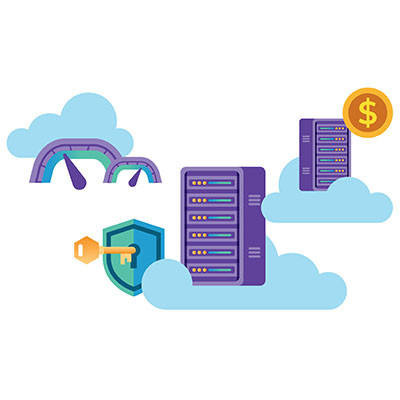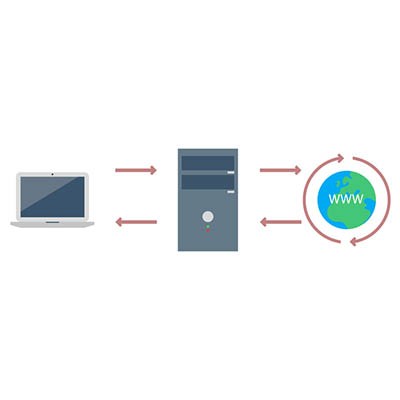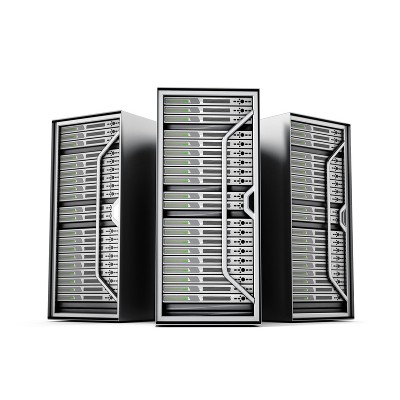Selecting the right servers for your business is extremely important and can either promote optimal performance, reliability, and security of your business computing; or it can present nothing but problems. Today, we will go through six tips to help you make good decisions about servers for your business.
k_Street Consulting, LLC Blog
Your servers run the technology that fuels your business. That’s why they are the most important (and expensive) pieces of hardware that you house. When it comes time to refresh one (or all) of your servers, you need to make a choice: Do you purchase a new server to host in-house or do you move your central computing to the cloud?
The cloud is one of the most valuable tools available to modern businesses, but the extent to which organizations utilize it will vary depending on their specific needs. For example, some organizations might be fine with the limited control offered by the public cloud, but others might need more dynamic features and control over their data with a private cloud. We’ll help you determine which is right for you, as well as some of the specific considerations needed for a private cloud solution.
It is little wonder that, with millions of businesses relying on their secure servers for a variety of computing needs, that Microsoft reigns supreme in profitability. In order to maintain this status, Microsoft must make sure that their software is properly cared for and supported - or retired if these titles are no longer practical to maintain. SQL Server 2008 and SQL Server 2008 R2 are soon due for the chopping block, with an official retirement date of July 9, 2019.
It is impossible to understate the importance of a server to today’s businesses. We talk a big game as to how important data is, but we don’t often broach the topic of how important it is to ensure that your server is well-maintained. Below, we discuss how to determine what your servers need for optimal performance, and how you can be sure that they get it.
When a business undergoes a hardware refresh, it often comes saddled with unexpected costs and downtime. This is sometimes caused by hardware failure, or from unplanned-for data migration. With the advent of virtualized servers, businesses now have a better way to recover from the woes of server refreshes. Rather than purchase new hardware, it’s more economically viable to go with a virtual server that’s hosted in the cloud.
You don’t have time to worry about managing your email solution, but it’s still a vital aspect of your business’s operations. You never know when someone will fall for a spam message, and you certainly can’t look over the shoulders of each employee to make sure they don’t. What’s the busy business owner to do? How can you get quality email management without it eating up too much time and effort on your part?
Your server room may be somewhat intimidating to consider. Wires everywhere, mechanical boxes that just sit there, lights blinking intermittently, and the distinct feeling that you probably shouldn’t touch anything - not even a proxy server, whatever that is. However, to help you get to know your tech, the proxy server is exactly what we discuss below!
Generally, small businesses will only have, at the most, a couple of servers in the office that are dedicated to storing or sharing data across an in-house network. These machines are absolutely critical to the success of your organization, as without them, you wouldn’t be able to access or store important information. If you want to optimize the way your server infrastructure is set up, however, virtual cloud-based servers can offer a significant benefit for your organization.
When an organization implements new software solutions, they are usually trying to either replace deprecated applications or find a solution to a particular problem. These solutions are often implemented without regards to the older software, and they’ll just collect dust on the network until someone decides to remove them. These unnecessary apps could be wasting precious time and resources for your business. In fact, up to 38 percent of enterprise applications aren’t being used on business networks.
 Business owners know all too well how painful it can be to manage technology. In addition to making sure that your business functions properly, you also need to keep your technology in working order. Many organizations that rely on technology in order to stay productive free up valuable time and resources by outsourcing their needs to third-party providers.
Business owners know all too well how painful it can be to manage technology. In addition to making sure that your business functions properly, you also need to keep your technology in working order. Many organizations that rely on technology in order to stay productive free up valuable time and resources by outsourcing their needs to third-party providers.
 Do you know which database management system is used by your company’s servers? Obviously your end users aren’t expected to know the answer to this question, but this is something that you, as a business owner, need to be aware of. If you don’t keep track of which database software you’re using, you might accidentally wait too long and wind up running an unsupported piece of software. For example, you need to move away from SQL Server 2005 (which is now unsupported) as soon as possible.
Do you know which database management system is used by your company’s servers? Obviously your end users aren’t expected to know the answer to this question, but this is something that you, as a business owner, need to be aware of. If you don’t keep track of which database software you’re using, you might accidentally wait too long and wind up running an unsupported piece of software. For example, you need to move away from SQL Server 2005 (which is now unsupported) as soon as possible.
 Technology, while a great asset that can be leveraged for your benefit, can also frighten businesses due to how unpredictable it can be at times. The constant threat of data loss, identity theft, and hardware failure can cripple your business’s ability to retain operations. Specifically, businesses can learn about risk management by analyzing the processes used by an industry where risk management is absolutely critical: nuclear power plants.
Technology, while a great asset that can be leveraged for your benefit, can also frighten businesses due to how unpredictable it can be at times. The constant threat of data loss, identity theft, and hardware failure can cripple your business’s ability to retain operations. Specifically, businesses can learn about risk management by analyzing the processes used by an industry where risk management is absolutely critical: nuclear power plants.
 With the United States’ Presidential election ramping up, it’s hard to go anywhere without seeing Hillary Clinton’s face. The former U.S. secretary of state and first lady, Clinton is making her second attempt at the Presidency. She has gained some negative attention recently in regards to emails she had sent from a personal email address when she was the United States’ top diplomat and it’s opened up some questions about data security at the highest reaches of government.
With the United States’ Presidential election ramping up, it’s hard to go anywhere without seeing Hillary Clinton’s face. The former U.S. secretary of state and first lady, Clinton is making her second attempt at the Presidency. She has gained some negative attention recently in regards to emails she had sent from a personal email address when she was the United States’ top diplomat and it’s opened up some questions about data security at the highest reaches of government.
 In order to keep up with the latest industry trends, businesses are turning to technology management solutions that help them better leverage their assets to garner leads and optimize operations. One such technology is virtualization, which improves access to desktop infrastructures and data stored on virtual servers. In fact, you can even use virtualization to make your applications much more accessible and flexible.
In order to keep up with the latest industry trends, businesses are turning to technology management solutions that help them better leverage their assets to garner leads and optimize operations. One such technology is virtualization, which improves access to desktop infrastructures and data stored on virtual servers. In fact, you can even use virtualization to make your applications much more accessible and flexible.
 Is your business taking advantage of server virtualization? It’s a popular solution that increases efficiency and minimizes risk. Yet, despite the well-known benefits of virtualization, there are still businesses that are hesitant to adopt it. Are you still on the fence about virtualization? Consider these top three reasons why server virtualization may be right for you.
Is your business taking advantage of server virtualization? It’s a popular solution that increases efficiency and minimizes risk. Yet, despite the well-known benefits of virtualization, there are still businesses that are hesitant to adopt it. Are you still on the fence about virtualization? Consider these top three reasons why server virtualization may be right for you.
 The next major operating system to get the ax from Microsoft is Windows Server 2003. Slated to have its mainstream support ended on July 14th, businesses that currently use the software need to begin making plans to upgrade their system as soon as possible. With this server operating system no longer being supported by Microsoft, your data will be vulnerable to the latest online threats.
The next major operating system to get the ax from Microsoft is Windows Server 2003. Slated to have its mainstream support ended on July 14th, businesses that currently use the software need to begin making plans to upgrade their system as soon as possible. With this server operating system no longer being supported by Microsoft, your data will be vulnerable to the latest online threats.
 With new technology being produced every day, it’s only natural that the IT industry grows alongside it. Due to this, you might have a lot of unused junk lying around from continuous upgrades. A lot of this old technology might still be perfectly usable, if a bit old; but it’s important that you know when to say “goodbye” and replace your IT equipment.
With new technology being produced every day, it’s only natural that the IT industry grows alongside it. Due to this, you might have a lot of unused junk lying around from continuous upgrades. A lot of this old technology might still be perfectly usable, if a bit old; but it’s important that you know when to say “goodbye” and replace your IT equipment.
 Are you still hosting your own server? You know it can be exhausting, and that it takes up a lot of time and effort. It's just like organizing your housewarming party. If you're too busy making sure everything is good to go, nobody will be able to see the star of the party - you. What if we told you that you don't have to worry about all of the details?
Are you still hosting your own server? You know it can be exhausting, and that it takes up a lot of time and effort. It's just like organizing your housewarming party. If you're too busy making sure everything is good to go, nobody will be able to see the star of the party - you. What if we told you that you don't have to worry about all of the details?
 Your company's most valuable assets are that which are irreplaceable, like your computer data. Data is stored in a server, which makes your server the most important piece of equipment in your office. Given the crucial role your server plays in your business, you will want to make sure to have the perfect server unit for your organization. Here's how to shop for the best server for you!
Your company's most valuable assets are that which are irreplaceable, like your computer data. Data is stored in a server, which makes your server the most important piece of equipment in your office. Given the crucial role your server plays in your business, you will want to make sure to have the perfect server unit for your organization. Here's how to shop for the best server for you!
 It's no secret that businesses often have limited space and resources. The problem is that you need your IT infrastructure in order to do business, and when you don't have a dedicated server room, you have to house your server in a common area. This presents an annoyance since a running server sounds like an air conditioning unit on full blast.
It's no secret that businesses often have limited space and resources. The problem is that you need your IT infrastructure in order to do business, and when you don't have a dedicated server room, you have to house your server in a common area. This presents an annoyance since a running server sounds like an air conditioning unit on full blast.
 According to IDC, the fastest growing sector in the new cloud IT market is Infrastructure as a service (IaaS). This consists of providing users virtual machines and other resources to manage tasks over the Internet, and it's scalable to the user's needs. Additional services offered over the cloud include firewalls, load balancers, IP addresses, virtual-machine disk image library, raw (block) and file-based storage, virtual local area networks (VLANs), and software bundles. With IaaS, the cost will reflect the resources allocated and consumed, making it an attractive option for businesses wanting to take advantage of these services without having to purchase and maintain their own IT infrastructure.
According to IDC, the fastest growing sector in the new cloud IT market is Infrastructure as a service (IaaS). This consists of providing users virtual machines and other resources to manage tasks over the Internet, and it's scalable to the user's needs. Additional services offered over the cloud include firewalls, load balancers, IP addresses, virtual-machine disk image library, raw (block) and file-based storage, virtual local area networks (VLANs), and software bundles. With IaaS, the cost will reflect the resources allocated and consumed, making it an attractive option for businesses wanting to take advantage of these services without having to purchase and maintain their own IT infrastructure.















